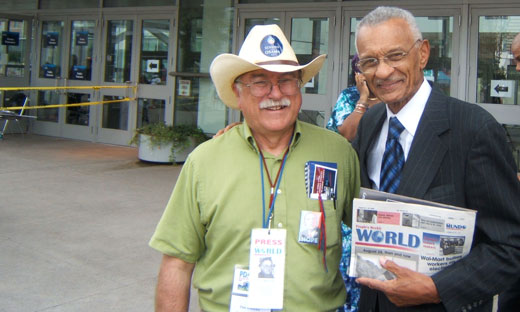by: Tim Wheeler

WASHINGTON – At a White House ceremony Nov. 20, President Obama conferred the Presidential Medal of Freedom on the Rev. C. T. Vivian, one of the nation’s staunchest fighters for racial equality and voting rights.
Vivian was one of 16 recipients of the award this past Wednesday, including former President Bill Clinton, and television personality Oprah Winfrey. Obama hailed Vivian for serving as one of the Rev. Martin Luther King Jr.’s closest advisers and for putting his life on the line in the struggle to end segregation.
Ironically, Obama himself, the first African American president, is living proof of Vivian’s success.
I got to know Rev. Vivian in March 2005 when I was assigned by this publication’s predecessor, the People’s Weekly World, to cover the Edmund Pettus Bridge Crossing Jubilee in Selma, Ala. This was a march commemorating the 40th anniversary of the brutal attack on voting rights marchers crossing that bridge on their way to the state capitol in Montgomery, Ala., to demand equal voting rights. Alabama state troopers brutally attacked the marchers on March 7, 1965, nearly clubbing to death John Lewis, D-Ga., then the national chairman of the Student Nonviolent Coordinating Committee.
That attack backfired badly on Alabama Gov. George Wallace. Scenes of the vicious attack were aired on network television, touching off nationwide outrage. A few months later, Congress approved and President Lyndon Johnson signed the Voting Rights Act of 1965, clearing the way, ultimately, for thousands of African Americans to win election to public office, most notably President Obama.
Rev. Vivian was present at the opening shot of that struggle, leading a march Feb. 16, 1965, to the courthouse in the nearby town of Marion, seat of Perry County, to protest the arrest of Rev. James Orange, a leader of the Southern Christian Leadership Conference (SCLC). The police had been instructed to target Rev. Vivian, also an SCLC leader. After the police assault, the marchers scattered. Marcher Jimmie Lee Jackson hid with his mother in a closed and darkened café. State Trooper James Fowler tracked Jackson down and shot him to death as Jackson attempted to cover his mother with his own body.
Outrage over the police murder of Jimmie Lee Jackson triggered the first attempt to march across the Edmund Pettus Bridge.
Forty years later, March 5, 2005, I joined thousands of marchers peacefully marching across the bridge. The main demand of the march was renewal, without weakening amendments, of the Voting Rights Act. Specifically, the march demanded renewal of the “pre-clearance” clause. This was a section of the law that requires states with a history of voter discrimination to submit any changes in its voting procedures for review by the U.S. Justice Department. President George W. Bush and the Republican leadership on Capitol Hill had unleashed a “charm offensive” even as they maneuveured to undermine the Voting Rights Act. They had assigned a delegation led by Sen. Bill Frist, R-Tenn., to join the Bridge Crossing Jubilee. But the marchers were not fooled.
When we reached the east end of the bridge, there was Rev. Vivian standing in the midst of the crowd, a look of joy on his face. I asked him for an interview. “Don’t take voting rights for granted,” he told me, referring to the theft in Florida of the 2000 presidential election. “We took it for granted that if we had the right to register and vote, our votes would be counted. We never imagined that 40 years later we would have to launch a whole new struggle. But we now know that many poor people never had their votes counted in the 2000 election or in the 2004 election. Given the character of the people now in power, we can have no confidence that our votes are being counted.”
That interview echoed Rev. Vivian’s speech a few hours earlier to the congregation in the Selma church that had served as the headquarters of the voting rights movement in 1965. Sen. Frist and other Republicans were in the standing room crowd as Vivian blasted Bush’s war in Iraq and the nationwide attack on voting rights by the ultra-right Republicans. Vivian received a standing ovation.
I interviewed Vivian by phone several times after that. In the summer of 2008, I was in Denver covering the Democratic National Convention that nominated Barack Obama for president. I was standing outside the Colorado Convention Center passing out copies of the People’s Weekly World when who walked up but C. T. Vivian. We greeted each other warmly and I handed him a copy of the PWW. Someone with a camera was about to click our picture. “Wait a minute,” he said, shifting the paper so it was plainly visible under his arm. That’s my fondest memory of the Rev. C. T. Vivian, a real hero of the people’s movement.
He is still in the thick of the fight for voting rights and for full equality even as the Republicans do all in their power to strip people of that vital tool of democracy. As he told me in 2005, “We have to march all over again.”
Photo: Rev. C. T. Vivian, right, poses for a photo with reporter Tim Wheeler outside the 2008 Democratic National Convention in Denver. Courtesy Tim Wheeler















